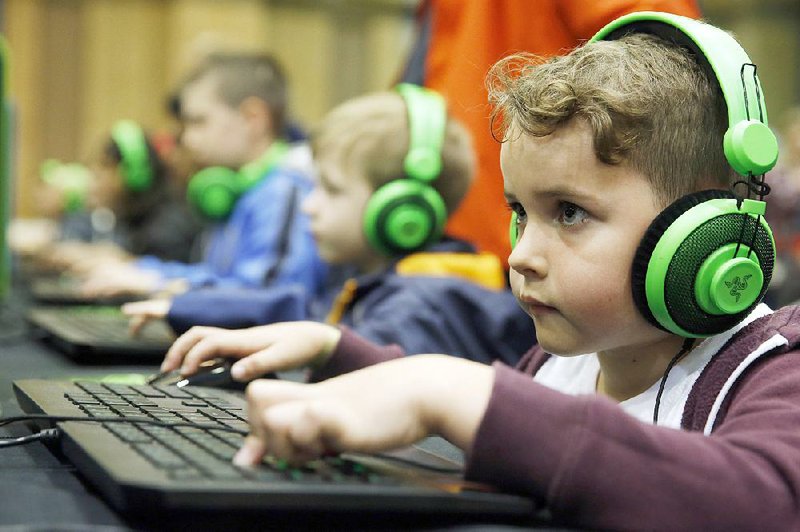Teachers in thousands of schools in dozens of countries use the video game Minecraft to teach subjects from math to English to computer programming through MinecraftEdu. They use a modified version of the game first made in 2011 by an independent group of teachers and computer programmers.
Microsoft is validating their work by turning MinecraftEdu into the centerpiece of its own business plans for Minecraft as an educational tool. But MinecraftEdu's creators aren't coming along for the ride.
Now Microsoft is buying the MinecraftEdu franchise.
Microsoft is as excited as the other giants of the technology industry to gain a foothold in schools. Since Minecraft is that rare product considered both potentially educational and fun, the company sees a big opportunity here.
The move also marks the closing chapter on one of Minecraft's most notable user-made modifications. So-called mods are a huge part of Minecraft's appeal, and users have built new features for the games that add trees, nuclear reactors, or in-game quantum computers.
Mojang, the company that makes the game, welcomed the grassroots movement. Since Microsoft bought Mojang for $2.5 billion in late 2014, modders have been looking for signs that Microsoft plans to rein-in this freewheeling culture in the name of more control and higher profits.
People have continued to freely make Minecraft mods since the acquisition, and Microsoft's Dierdre Quarnstrom, the head of Minecraft Education at Microsoft, had nothing but positive things to say about TeacherGaming, the startup that made MinecraftEdu.
"They've done an amazing job," she said. But it was always unlikely that MinecraftEdu would continue to exist independently.
Joel Levin, a computer teacher at a private school in New York City, began work on a modified version of the game in 2011 for use in his own classroom; none of the 120 7- and 8-year-olds he taught had heard of the game at that time.
He then teamed up with Santeri Koivisto, a Finnish entrepreneur, to start a company called TeacherGaming that developed their customized version of the game. It let teachers run a Minecraft for classrooms off their own servers and gave them control to set parameters for their students. The two men got Mojang to give them a licensing agreement so they could sell MinecraftEdu to schools.
TeacherGaming charged $41 for teachers to set up the server, then about $15 for each student license. 7,000 schools in about 40 countries now use MinecraftEdu. This was enough for a tiny startup like TeacherGaming to turn a profit. It even began to develop other products designed to bring video games into schools -- a prescient move because both TeacherGaming and its fans realized immediately that the Microsoft deal would change things.
"Obviously when Microsoft came in it wasn't clear what was going to be allowed," Levin said. "We had been working with this funky independent Swedish game studio and suddenly we're working with one of the world's largest corporations."
Letting a 12-person startup continue to run the operation of Minecraft in schools didn't make sense for Microsoft or Mojang. Levin and his colleagues would essentially sit around and wait to see what each new edition of Minecraft would look like, then update their version accordingly.Vu Bui, the chief operating officer at Mojang, says that creating an educational version in-house would make it easier to add features teachers needed.
"Some of these were already in MinecraftEdu, but because it isn't part of the core game, it wasn't the easiest to implement," he said.
Microsoft's new version, called Minecraft: Education Edition, includes features like better maps and the ability for teachers to share the worlds their students have built with one another more easily. It also abandons the one-time fee that TeacherGaming charged in favor of a $5 subscription per student per year. At the onset, it is offering indefinite free trials. Microsoft is planning to promote the game immediately, and will have a new version ready for sale by the time the new school year starts this fall.
Neither side would discuss terms of the deal announced this month. When asked whether he tried to negotiate an arrangement to continue to work on MinecraftEdu as part of Microsoft, Levin said only that, "there were some twists and turns."
He says that the deal leaves TeacherGaming with the resources to develop other lines of business bringing video games into schools. It has already made a prototype of its own game. But its main goal is to help modify other commercial video games for educational uses, then distribute them in schools -- a strategy that has eluded many video game publishers.
The issue, says Levin, is that the companies that make most well-known games generally don't want to let little start-ups muck around with their products.
Given how little luck they've had working with big companies, TeacherGaming is trying to find smaller developers who are open to experimentation, says Levin. "Sort of like what Mojang was like when we started working with them."
SundayMonday Business on 01/25/2016

